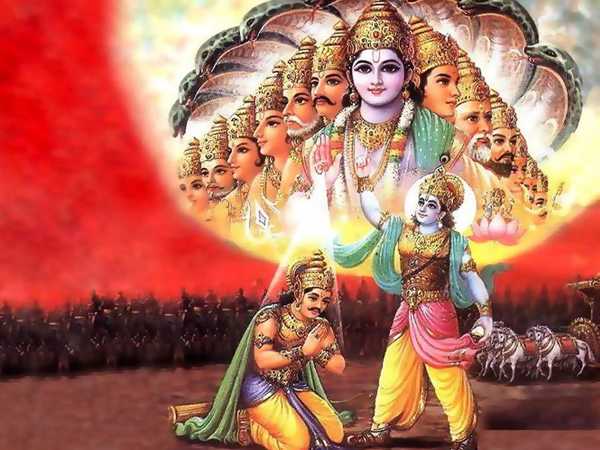Chapter 81

“Arjuna said, ‘What business brought thee here, O daughter (-in-law) ofKuru’s race, and what also is the cause of the arrival on the field ofbattle of her who is the mother of the ruler of Manipura? Dost thouentertain friendly motives towards this king, O daughter of a snake? Othou of restless glances, dost thou wish good to me too? I hope, O thouof ample hips, that neither I, nor this Vabhruvahana here, have, Obeautiful lady, done any injury to thee unconsciously? Has Chitrangada offaultless limbs, descended from the race of Chitravahana, done thee anywrong?’ Unto him, the daughter of the prince of snakes answeredsmilingly, ‘Thou hast not offended me, nor has Vabhruvahana done me anywrong; nor this prince’s mother who is always obedient to me as ahand-maid. Listen, how all this has been brought about by me. Thoushouldst not be angry with me. Indeed, I seek to gratify thee by bendingmy head in reverence. O thou of Kuru’s race, all this has been done by mefor thy good, O puissant one. O mighty-armed Dhananjaya, hear all that Ihave done. In the great battle of the Bharata princes, thou hadst slainthe royal son of Santanu by unrighteous ways. What I have done hasexpiated thy sin. Thou didst not overthrow Bhishma while battling withthee. He was engaged with Sikhandin. Relying on him as thy help, thoudidst compass the overthrow of Santanu’s son. If thou hadst died withouthaving expiated thy sin, thou wouldst then have fallen without doubt intoHell in consequence of that sinful act of thine. Even this which thouhast got from thy son is the expiation of that sin. Formerly, O ruler ofEarth, I heard this said by the Vasus while they were in the company ofGanga, O thou of great intelligence. After the fall of Santanu’s son,those deities, viz., the Vasus, coming to the banks of Ganga, bathed inher waters, and calling the goddess of that stream, they uttered theseterrible words having the sanction of Bhagirathi herself,viz.,–Santanu’s son Bhishma has been slain by Dhananjaya. Verily, Ogoddess, Bhishma then was engaged with another, and had ceased to fight.For this fault we shall today denounce a curse on Dhananjaya.–To this,the goddess Ganga readily assented, saying,–Be it so!–Hearing thesewords I became very much afflicted and penetrating into the netherregions represented everything to my sire. Informed of what had happened,my sire became plunged in grief. Repairing to the Vasus, he solicitedthem for thy sake, repeatedly gratifying them by every means in hispower. They then said unto him, ‘Dhananjaya has a highly blessed son who,endued with youth, is the ruler of Manipura. He will, standing on thefield of battle, cast Dhananjaya down on the Earth. When this willhappen, O prince of snakes, Arjuna will be freed from our curse. Do thougo back.–Thus addressed by the Vasus, he came back and informed me ofwhat had happened. Having learnt all this, O hero, I have freed thee fromthe curse of the Vasus even in this way. The chief of the deities himselfis incapable of vanquishing thee in battle. The son is one’s own self. Itis for this that thou hast been vanquished by him. I cannot be held, Opuissant one, to have committed any fault. How, indeed, wouldst thou holdme censurable?’–Thus addressed (by Ulupi), Vijaya became cheerful ofheart and said unto her, ‘All this that thou hast done, O goddess, ishighly agreeable to me.’ After this, Jaya addressed his son, the ruler ofManipura, and said unto him in the hearing of Chitrangada, the daughter(-in-law) of Kuru’s house, the Horse-sacrifice of Yudhishthira will takeplace on the day of full moon in the coming month of Chaitra. Come there,O king, with thy mother and thy counsellors and officers.’ Thus addressedby Partha, king Vabhruvahana of great intelligence, with tearful eyes,said these words to his sire, ‘O thou that art conversant with everyduty, I shall certainly repair, at thy command, to the greatHorse-sacrifice, and take upon myself the task of distributing food amongthe regenerate ones. For, however, showing thy grace towards me, thouenter thy own city with thy two wives. Let no scruple, be thine asregards this, O thou that art fully acquainted with every duty. O lord,having lived for one night in thy own mansion in happiness, thou maystthen follow the steed, O foremost of victorious warriors. Theape-bannered son of Kunti, thus addressed by his son, answered the childof Chitrangada, saying ‘Thou knowest, O mighty-armed one, what vow I amobserving. O thou of large eyes, till the termination of this my vow, Icannot enter thy city. O foremost of men, this sacrificial horse wandersat will. (I have to follow it always.) Blessings on thee! I must go away.Place I have none wherein to rest for even a short while.’ The son of thechastiser of Paka then, duly worshipped by his son and obtaining thepermission of his two wives, left the spot and proceeded on his way.'”




